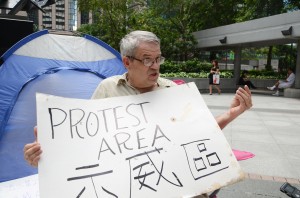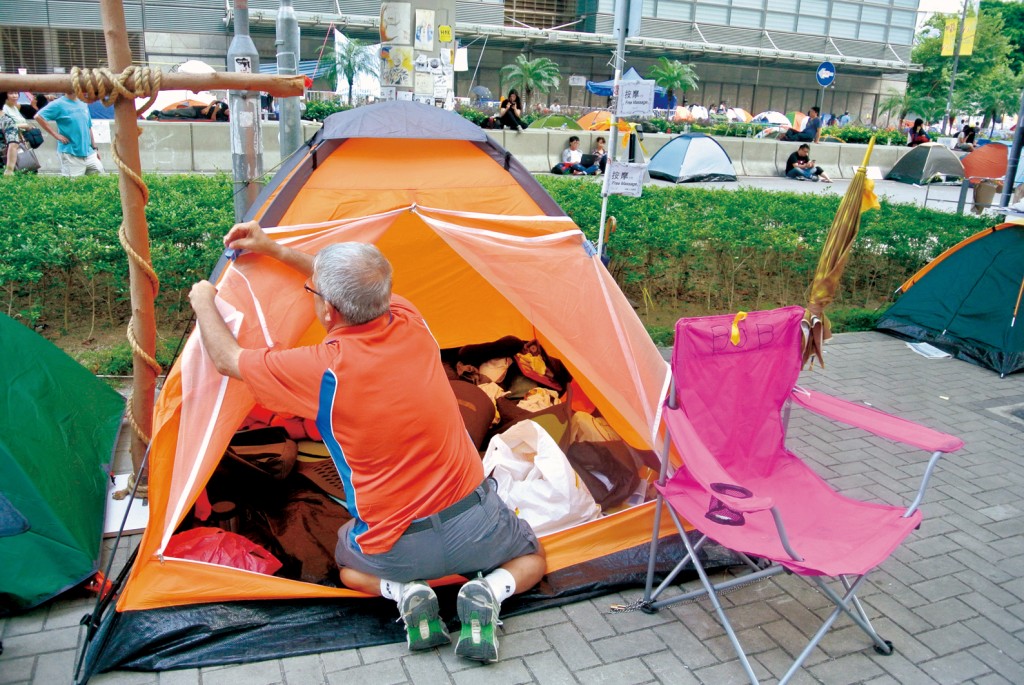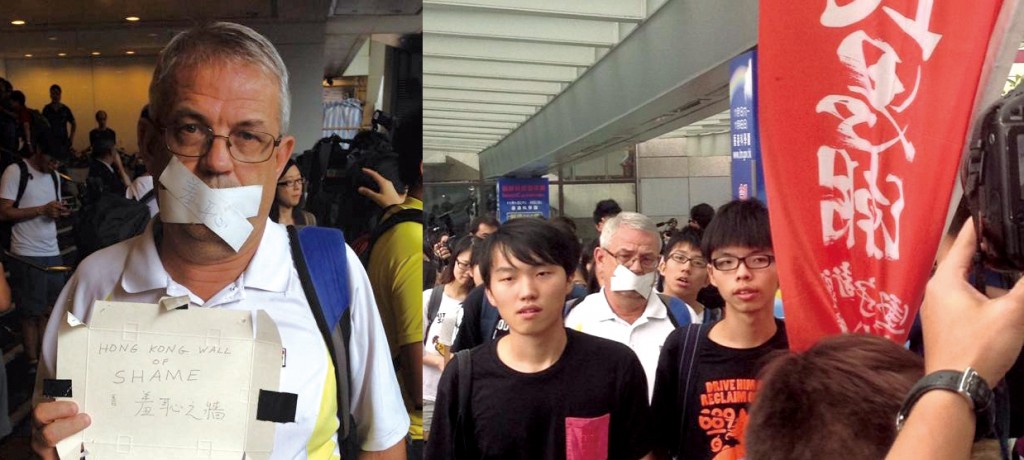American Bob Kraft is on a mission to “do the right thing”
By Henry Lee
In the scorching sun and pouring rain, protesters taking part in the occupation of Admiralty starting in late September sometimes sat quietly, sometimes sang songs, sometimes conducted heated discussions and sometimes slept. Among them was a silver-haired, 57-year-old American man, sitting on a folding chair and facing the now fenced and heavily guarded forecourt of the Central Government Offices popularly known as Civic Square.
Varsity first met the American, Pastor Bob Kraft, before the Occupy action began. He was setting up a tent and some hand-made banners outside the District Court in Wan Chai. Kraft was there to protest about what he saw as inadequate family rights and child rights in Hong Kong.

Kraft is always speaking out against injustice in society and is often seen at political events and protests. He undertook a 106-hour hunger strike for family rights and child rights in the summer of 2013; he protested on behalf of the elderly who do not have money to fix their teeth and he went to the “Black Cloth March” organised by Occupy Central to call for genuine universal suffrage in Hong Kong. His devotion to such causes is driven by his past.
Kraft was a high school student in the United States during the 1960s and 1970s when there were lots of protests against the Vietnam War and racism. He recalls that on his first day of high school, students started a class boycott to demand more student rights. He says this made a big impact on him.
After high school, Kraft says he joined the army and was stationed in West Germany during the Cold War. This experience consolidated for him the idea that freedom could make a difference to people’s lives.
Although he served in the military, Kraft’s great interest was, in fact, in tennis. After he left the army, he worked as a tennis coach and ran a business selling sportswear. All went well for him, but he started to question his life.
“You reach a point when you just say, this is really not the most important thing in a person’s life. You can’t go any further,” says Kraft. “I just turned my life into a direction; that is helping people, instead of helping myself.”
So, in 1986, Kraft sold his business and went to the Pacific and Asia Christian University in Hawaii before embarking on church work in Asia. He travelled to seven nations in Asia, including the Philippines, and was shocked by how the disadvantaged lived there. The experience opened his eyes to inequality and injustice and showed him that where there is injustice, there can be no human rights. Kraft resolved to lead a meaningful life, helping the underprivileged and speaking out against injustice.
In 1992, Kraft settled down in Hong Kong after marrying his Chinese wife. As a pastor, he has to be concerned about the lives of the people in his community. He sees people in Hong Kong facing worsening social problems, such as unfair working conditions, housing problems, poor family relations, and unfavourable government policies. “The anger of the people is about the living standards of people…It’s becoming unbearable for people…They almost can’t sustain their living,” he says.
Tensions, resentment and dissent in society have risen in recent years. In 2013, around 120,000 people gathered in Civic Square, outside the Central Government Office (CGO) to oppose the government’s decision to reject HKTV’s application for a licence to operate free terrestrial television services.
After other protesters had left Civic Square, Kraft chose to stay and camp out there with some of the HKTV staff who had stayed behind to continue their protest. After two weeks he told the HKTV protesters he would continue to stay because it was hard to get a spot in that location and it was important to express opinions.
“And then it was just me and the tent.” Kraft says.
After that, he stayed in Civic Square for nine months. During that period, Kraft witnessed many stories that were never captured on camera. He recalls a woman who protested frequently at the CGO with a big banner. The first time that he saw her protesting, he saw security guards grabbing her and taking her to the interrogation room. After she left the room, Kraft talked to her and explained that she had the right to protest. He says that after speaking to her, the woman realised there was nothing the guards could do to remove her.

Kraft says that before the fence went up, there were around five to ten protests a day outside the CGO, most of which were never covered in the news because they were too small-scale. It was with this in mind that he began to take videos and photos and posted them on social media, which in turn helped these protests grow.
The police and security guards did try to get Kraft to leave Civic Square, but to no avail. “I knew that it was a public area…I have the right to protest under the Basic Law,” says Kraft. Growing up in a liberal nation, Kraft thinks freedom and individual rights are imperative and correct. “My conscience said it’s correct. Freedom of speech, freedom of writing, is correct. What I did was spoke the truth, nothing more than that, nothing improper,” he says.
But Kraft’s days inside Civic Square were numbered. On July 18 this year, when he was not at the site, the government put up a three-metre high perimeter fence. When he returned to Civic Square the next day, his tent and his belongings were removed.
Now, members of the public are no longer permitted to enter Civic Square on weekdays. Kraft believes this is unlawful. “The CGO is saying we have to protest between Saturday midnight and Sunday 6pm. What kind of law is that? There is no law like that,” says a furious Kraft. So, with the help of legislator Albert Ho Chun-yan, he is planning to apply for a judicial review against the government’s decision.
But well before any legal proceedings could begin, the people’s anger exploded on the night of September 26 when students breached a security barrier in the fence and entered the forecourt to “reclaim Civic Square”. This came at the end of a week-long class boycott to protest against the National People’s Congress Standing Committee’s restrictive framework for the Chief Executive election in 2017.
Kraft is impressed with what he has seen of student power in Hong Kong. He recalls a march led by Scholarism to oppose Beijing’s decision on the 2017 election, where more than 1,000 people marched from the CGO to the hotel where Li Fei, the chairman of the Basic Law Committee, was staying. Kraft was one of the protesters.
“Twenty people were leading 1,500. What happens if there are 200 students? What happens if there are 2,000 students? How many can they lead? Millions!” he says.
Kraft finds hope in Hong Kong’s passionate young people who he considers to be future pillars of society. “I believe this is an important time for the future of Hong Kong, for the students…They are developing their mindsets of what is good and what is right for the future of Hong Kong.”

His care for the next generation is not just confined to the student protesters. As a father of two, Kraft has been extremely transparent to his children about what he does. His son, eight, and daughter, 12, have seen how he helps people and are being educated on how they can also make changes in society.
Because of his frequent participation in political events, Kraft’s children have had the chance to talk to different people, including members of the Legislative Council. He describes this as another form of education. “People in Hong Kong read the newspaper…They get a one-sided view, that is the newspaper view or the reporter’s viewpoints. But my children actually have more than one view. They have my view, and they have some other views of other people,” Kraft explains.
Fighting on the frontline of Hong Kong’s political battles, Kraft is grateful that he has his children’s support and understanding. “I think their suffering would be much greater if I don’t do something about it. So I may have to pay a high price,” he says.
“I am saying what I feel is correct, I am not bothering anybody, I am not violent, I have a voice,” Kraft says. “It is always right to do right.”
Edited by Sharon Lee











































Kraft said he was not bothering anybody but how does he respond to those comments from anti-occupy parties?
I say I am sitting in a big pink chair, smiling and being friendly to everyone. And sitting at a public sidewalk.